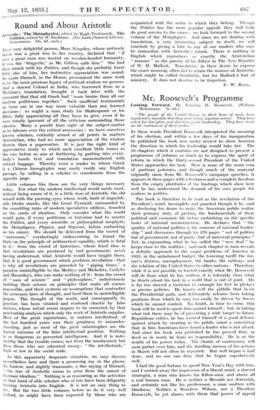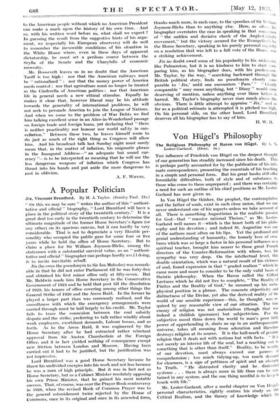Mr. Roosevelt's Programme
Looking Forward. By Franklin D. Roosevelt. (William Heinemann. 7s. 6d.)
"The people of the United States, in their hour of need, have registered a mandate that they want direct, vigorous action. They hays asked for discipline and direction under leadership. They have made me the instrument of their wishes."
IN these words President Roosevelt interpreted the meaning of his election, and within a few days of his inauguration he published the book now under review to show America the direction in which his leadership would take her. The 16 chapters which it contains are not designed to present a programme of reforms so much as to express the spirit of reform in which the thirty-second President of the United States approaches his task. here is none of the worn coin of partisan polemics, and though much of the material originally came from Mr. Roosevelt's campaign speeches, it appears in these pages with a freshness and a complete freedom from the empty. platitudes of the hustings which show how well he has understood the demand of his own people for realism in politics.
The book is therefore to be read as the revelation of the President's mind, incomplete and guarded though it be, and as disclosing his desire to make the American public realize their primary duty of probing the fundamentals of their political and economic life before embarking on the specific tasks of national reconstruction. He declares that "the quality of national politics is the concern of national leader- ship" and discourses through his 270 pages "not of politics but of government, not of pudic i but of universal principles." Yet, in expounding what he has called the "new deal" he keeps close to the realities ; and each chapter in turn reveals a definite approach to the major problems of America in 1933, in the unbalanced budget, the towering tariff, the far- mer's distress,. unemployment, the banks, the railways and the relation of the United States to other nations. Therefore, while it is not possible to foretell exactly what Mr. Roosevelt will do from what he has written, it is tolerably clear what he thinks about his task in a world that is out of joint. He is far too shrewd a tactician to entangle his feet in pledges or precise policies. He knows well the pitfalls that beset the Presidential path, and deliberately refrains from taking positions from which he may too easily be driven by forces which he cannot control. No doubt, in time to come, this book will be used to quote him against himself ; but, in taking what risk there may be of presenting a wide target to future Republican critics, he has assured himself of a good defence against attack by creating in the public mind a conviction that in him Americans have found a leader who is not afraid. And since his book was published he has proved that, in deed as in word, he fears no responsibility. He is at the zenith of his power today. The clouds of controversy will soon gather over him, and the dazzling success of his actions in March will not often be repeated. But well begun is half done, and no one an deny that he began superlatively well.
I had the good fortune to spend New Year's Day with him, and I carried away the impression of a liberal mind, a shrewd strategist, a man who knows his fellow-men, and above all a real human man. He is neither a Messiah nor Jeremiah, and certainly not like his predecessor, a man smitten with blindness. Neither a Woodrow Wilson, nor a Theodore Roosevelt, he yet shares with them that power of appeal to the American people without which no American President can make a mark upon the history of his own time. - And so, with his written word before us, what shall we expect ? In guessing the result from the suggestive hints of his argu- ment, we (especially his European observers) will do well to remember the inexorable conditions of his situation in the White House where, even in these days of apparent dictatorship, he must set a perilous course between the Scylla of the Senate and the Charybdis of economic necessity.
- Mr. Roosevelt leaves us in no doubt that the American Tariff is too high : nor that the American railways must be rationalized " : nor that the money power of America needs control : nor that agriculture must no longer be treated as the Cinderella of American politics : nor that American life in general needs a new ethical stimulus. Equally he makes it clear that, however liberal may be his attitude towards the generality of international problems, he will not seek to persuade America to join the League of Nations. And when we come to the problem of War Debts we find him talking excellent sense in an Alice-in-Wonderland passage on foreign trade and foreign loans, yet declaring that there is neither practicality nor honour nor world safaty in can- cellation." Between these two, he leaves himself room to
• do just as much of the right thing as Congress will allow him. And his broadcast talk last Sunday night must surely mean that, in the matter of inflation, his enigmatic phrase in the Inaugural Address—" an adequate but sound cur- rency "—is to be interpreted as meaning that he will use the less dangerous weapons of inflation which Congress has thrust into his hands and put aside the more dangerous to rust in oblivion.
A. F. Wmf-rn.

































 Previous page
Previous page